山西省岢岚县中学外研版高中英语必修二:module1ourbodyandhealthyhabitsperiodiiilistening教案
高中英语外研版必修二Module1《OurBodyandHealthHabits》教案

⾼中英语外研版必修⼆Module1《OurBodyandHealthHabits》教案Module 1 Our Body and Health HabitsI. 教学内容分析本模块的话题围绕⽣活习惯、饮⾷起居、健⾝运动和疾病症状等的英语表达⽽展开,进⽽介绍了⼀些国家的医疗保健情况,从⽽使学⽣树⽴和养成爱好体育锻炼、注意⾝体健康的意识和习惯。
指导学⽣学会表达⾃⼰的见解和观点,通过进⼀步的讨论使学⽣明⽩什么样的⽣活习惯才是健康的。
Introduction这⼀部分先复习和学习与饮⾷、健康相关的词汇,通过Activity 2的活动进⾏巩固;接着列举了⼀些与饮⾷健康相关的谚语,通过对Activity 4的问题讨论使学⽣对中外的有关健康的谚语表达有个初步的认识。
Reading and Vocabulary 通过回答问题的形式复习和学习另外⼀些有关饮⾷健康的词汇;学习两篇介绍中国学⽣Zhou Kai的短⽂并完成相关练习,培养学⽣的综合阅读能⼒。
在情感态度上,通过周凯和其母亲的观点冲突和周凯对⾃⾝⽣活习惯的描述,帮助学⽣了解什么是健康的⽣活⽅式,如何形成健康的⽣活习惯。
并通过本部分的学习指导学⽣在实际⽣活中,如何来养成⾃⼰健康的⽣活习惯。
Speaking (1) 通过两⼈活动和⼩组活动来讨论如何保持⾝体健康,并且就⽣活中有关健康的重要事项来发表⾃⼰观点,通过讨论达成共识。
Function通过观察节选⾃阅读⽂章的句⼦体验如何表达将要发⽣的事情;并通过练习来学习和巩固。
Grammar (1)这⼀部分是学习名词作动词⽤的意义和⽤法,并通过练习使学⽣有初步认识。
但是不强调学⽣掌握具体的理论知识,只是初步了解和具体掌握⼀些实例。
Listening and Vocabulary先通过单词填空和回答问题活动导⼊有关⾝体器官、疾病症状、询问病情等的词汇和表达,为听⼒活动扫除词汇障碍;然后通过完成听⼒活动来培养学⽣获取信息的能⼒。
高中英语必修2(外研版)unit1ourbodyandhealthyhabits知识点总结
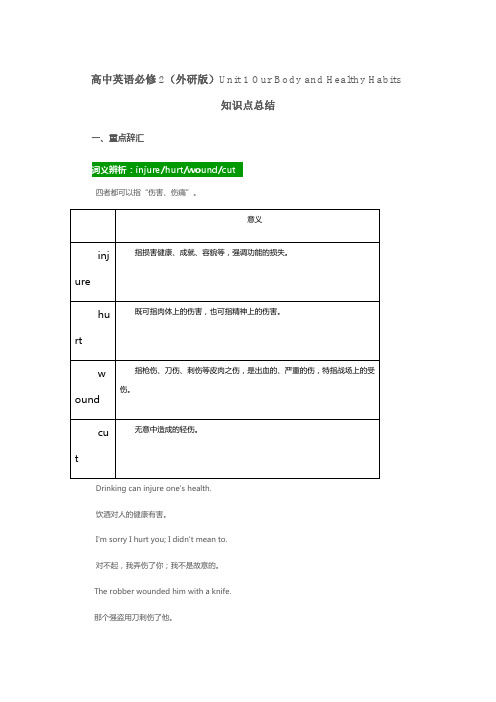
高中英语必修2(外研版)Unit 1 Our Body and Healthy Habits知识点总结一、重点辞汇四者都可以指“伤害、伤痛”。
Drinking can injure one's health.饮酒对人的健康有害。
I'm sorry I hurt you; I didn't mean to.对不起,我弄伤了你;我不是故意的。
The robber wounded him with a knife.那个强盗用刀刺伤了他。
How did you get that cut on your hand?你手上的伤口是怎么弄的?这四个词都有“普通的”、“常见的”意思。
其区别是:It's normal to feel tired after such a long trip.远程旅行后感到累是很正常的。
His name was Hansen, a common name in Norway.他的名字叫汉森,在挪威是一个常见的名字。
As a general rule, prices follow demands.一般而言,物价随需求而转变。
Now electrical appliances have entered into ordinary families.此刻,家用电器已经步入普通家庭。
diet n.饮食;节食1. a healthy/balanced diet:健康的/均衡的饮食2. go/be on a diet:用规定食谱;节食You don't have to go on a diet to lose weight.你不需要靠节食来减肥。
1. be anxious about sth.:为…担忧,忧虑2. be anxious for sth.:渴望…3. be anxious to do sth.:急于,渴望做某事I am anxious about the parcel because it hasn't arrived. 我对这包裹很担忧,因为它还没到。
外研版高中英语必修2 Module 1《Our Body and Healthy Habits》Se
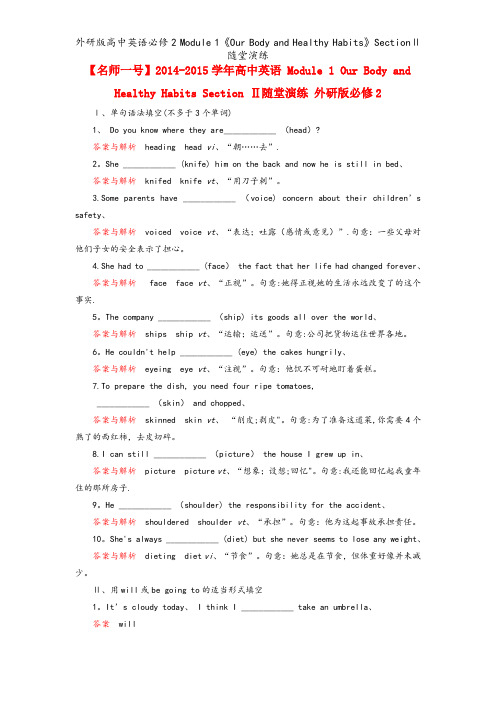
【名师一号】2014-2015学年高中英语 Module 1 Our Body and Healthy Habits Section Ⅱ随堂演练外研版必修2 Ⅰ、单句语法填空(不多于3个单词)1、 Do you know where they are____________ (head)?答案与解析heading head vi、“朝……去”.2。
She ____________ (knife) him on the back and now he is still in bed、答案与解析knifed knife vt、“用刀子刺”。
3.Some parents have ____________ (voice) concern about their children’s safety、答案与解析voiced voice vt、“表达;吐露(感情或意见)”.句意:一些父母对他们子女的安全表示了担心。
4.She had to ____________ (face) the fact that her life had changed forever、答案与解析 face face vt、“正视”。
句意:她得正视她的生活永远改变了的这个事实.5。
The company ____________ (ship) its goods all over the world、答案与解析ships ship vt、“运输;运送”。
句意:公司把货物运往世界各地。
6。
He couldn't help ____________ (eye) the cakes hungrily、答案与解析eyeing eye vt、“注视”。
句意:他饥不可耐地盯着蛋糕。
7.To prepare the dish, you need four ripe tomatoes,____________ (skin) and chopped、答案与解析skinned skin vt、“削皮;剥皮"。
外研版高中英语必修二英语Module1OurBodyandHealthyHabitsSectionⅢ
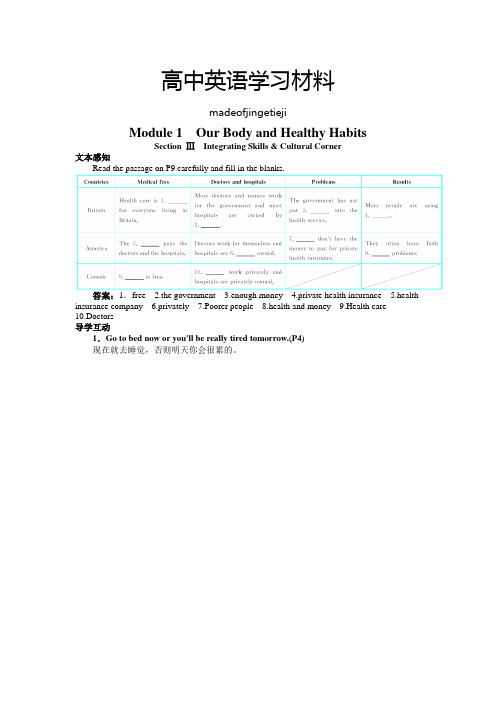
高中英语学习材料madeofjingetiejiModule 1Our Body and Healthy HabitsSection ⅢIntegrating Skills & Cultural Corner文本感知Read the passage on P9 carefully and fill in the blanks.答案:1.free 2.the government 3.enough money 4.private health insurance 5.health insurance company 6.privately7.Poorer people8.health and money9.Health care10.Doctors导学互动1.Go to bed now or you'll be really tired tomorrow.(P4)现在就去睡觉,否则明天你会很累的。
结构剖析“祈使句+and/or+陈述分句”结构中,祈使句相当于一个表示条件的状语从句。
用and 时,可把祈使句转换成肯定形式的条件状语从句;用or时,则转换成否定形式的条件状语从句。
Wear your coat or you'll catch a cold.穿上外套,否则你会着凉的。
Work hard and you can make progress.努力工作你就会取得进步。
联想拓展“名词短语+and/or+陈述句”也相当于一个含有条件状语从句的主从复合句。
One more word,and I'll knock you flat.再多说一句话,我就把你揍扁了。
(1)完成句子①Rush to school ______ you'll get there on time.②Eat more ______ you'll be hungry.(2)单项选择①Find ways to praise your children often,______ you'll find they will open their hearts to you.A.till B.or C.and D.but②It's really very dangerous;one more step,______ the baby will fall into the well.A.or B.so C.but D.and2.When we breathe,the air goes into our lung.(P5)我们呼吸时,空气进入肺中。
高中(外研版)英语必修2Module 1 Our Body and Healthy Habits1
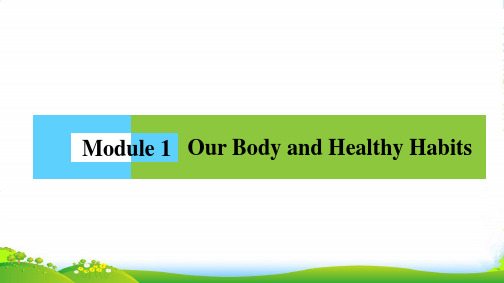
3.Be active. You must understand which activities you like best.Not everyone loves baseball or soccer.Maybe your interest is dancing.Ask your parents to help you do your favorite activities regularly.Find ways to be active every day. 4.Choose heபைடு நூலகம்lthy foods when dining out. Dining out has become a regular part of most people’s lifestyle.When you dine out,you should choose the restaurants that are now including healthy foods on their menus.This means that the meals are not rich in fat or salt.
词汇积累 1.discussion n. 2.healthy adj. 3.favorite adj. 4.choice n. 5.variety n. 6.regularly adv. 7.dine out 8.be rich in
讨论 健康的 特别受喜爱的 选择,选择权;供选择的范围 变化,多样化;种类 规则地;有规律地;定期地 在外用餐 ……的含量高,高含……
谢谢观看!
英语 必修2
Module 1 Our Body and Healthy Habits •1、人才教育不是灌输知识,而是将开发文化宝库的钥匙,尽我们知道的交给学生。
外研版高中英语必修2-Module one Our Body and Healthy Habits
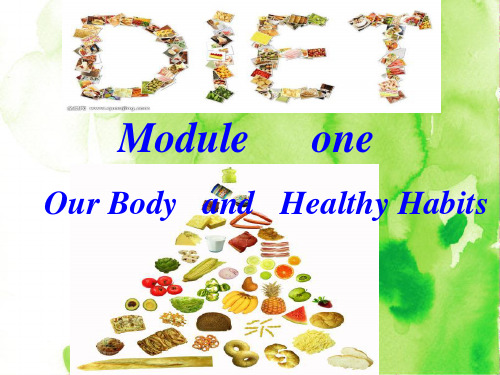
potato
cake fried chicken tomato leg
banana grape hamburger onion
apple barbecue cucumber carrot
Proper nutrition is important for good health. Don’t eat too much food with lots of fat and sugar. Eat plenty of food high in protein like meat, fish, eggs and nuts. Vegetables and fruits are very important because they provide necessary vitamins and minerals. However, don’t overeat.
(2) eating _fi_s_h_4__ti_m__es__a_w__e_ek_ (3) avoid eating _f_a_t_o_r_s_u_g_a_r__
情景再现(work in pairs) Zhou Kai (1)
Work with your partner to make up a dialogue according to Zhouikai 1.
Getting the proper amount of sleep is also important. If you don’t get enough sleep, you will feel tired.
Fast reading
高中英语外研版必修二教师用书Module 1 Our Body and Healthy Habits
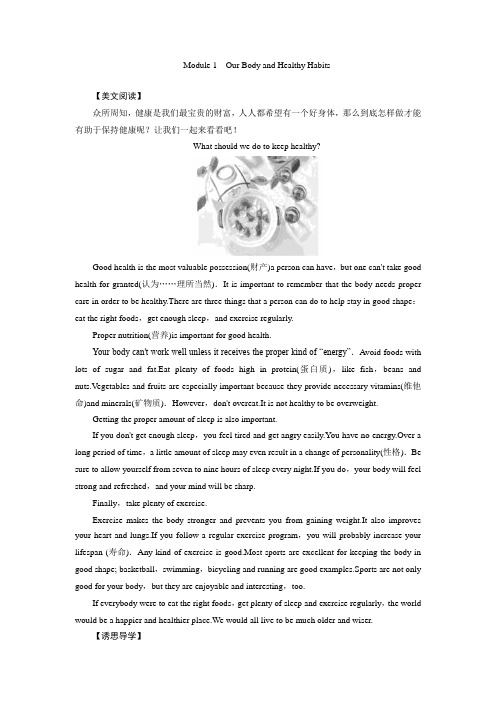
Module 1Our Body and Healthy Habits【美文阅读】众所周知,健康是我们最宝贵的财富,人人都希望有一个好身体,那么到底怎样做才能有助于保持健康呢?让我们一起来看看吧!What should we do to keep healthy?Good health is the most valuable possession(财产)a person can have,but one can't take good health for granted(认为……理所当然).It is important to remember that the body needs proper care in order to be healthy.There are three things that a person can do to help stay in good shape:eat the right foods,get enough sleep,and exercise regularly.Proper nutrition(营养)is important for good health.Your body can't work well unless it receives the proper kind of “energy”.Avoid foods with lots of sugar and fat.Eat plenty of foods high in protein(蛋白质),like fish,beans and nuts.Vegetables and fruits are especially important because they provide necessary vitamins(维他命)and minerals(矿物质).However,don't overeat.It is not healthy to be overweight.Getting the proper amount of sleep is also important.If you don't get enough sleep,you feel tired and get angry easily.You have no energy.Over a long period of time,a little amount of sleep may even result in a change of personality(性格).Be sure to allow yourself from seven to nine hours of sleep every night.If you do,your body will feel strong and refreshed,and your mind will be sharp.Finally,take plenty of exercise.Exercise makes the body stronger and prevents you from gaining weight.It also improves your heart and lungs.If you follow a regular exercise program,you will probably increase your lifespan (寿命).Any kind of exercise is good.Most sports are excellent for keeping the body in good shape; basketball,swimming,bicycling and running are good examples.Sports are not only good for your body,but they are enjoyable and interesting,too.If everybody were to eat the right foods,get plenty of sleep and exercise regularly,the world would be a happier and healthier place.We would all live to be much older and wiser.【诱思导学】1.Why do you think it is important to keep healthy?【答案】(1)Keeping healthy will make us study or work full of energy every day.(2)Keeping healthy will help to enjoy yourself every day.(3)Keeping healthy will...2.As it is important for us to keep healthy,but what do you think we should do to keep healthy?【答案】To keep healthy,we should have a good habit.Firstly,we should have a balanced diet every day and try to eat more vegetables and fruit.Secondly,we should take some exercise,such as walking,jogging,swimming,stly,we should try to be happy every day.Period ⅠPreviewing(教师用书独具)●教学目标本课时主要是通过学生对学案所给出的内容的学习,了解本课文中所出现的词汇,初步了解课文以及相关的背景知识,对下一堂课对课文的全面理解起到一个铺垫作用。
山西省太原市外研版高中英语必修二 Module 1 Our body and healthy ha
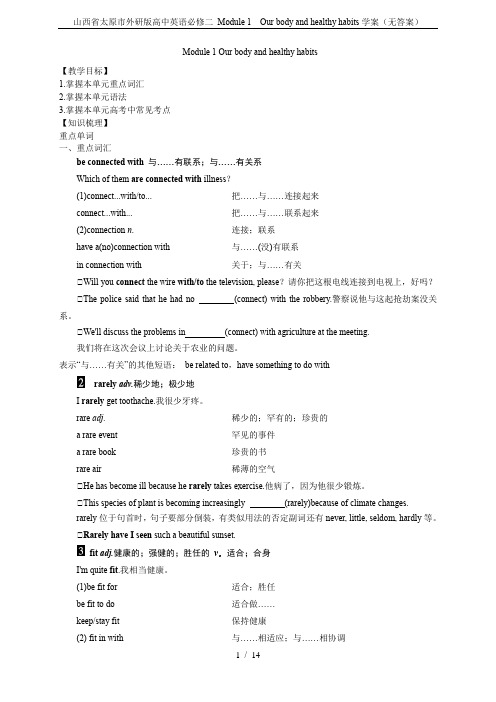
Module 1 Our body and healthy habits【教学目标】1.掌握本单元重点词汇2.掌握本单元语法3.掌握本单元高考中常见考点【知识梳理】重点单词一、重点词汇be connected with 与……有联系;与……有关系Which of them are connected with illness?(1)connect...with/to... 把……与……连接起来connect...with... 把……与……联系起来(2)connection n. 连接;联系have a(no)connection with 与……(没)有联系in connection with 关于;与……有关①Will you connect the wire with/to the television, please?请你把这根电线连接到电视上,好吗?②The police said that he had no (connect) with the robbery.警察说他与这起抢劫案没关系。
③We'll discuss the problems in (connect) with agriculture at the meeting.我们将在这次会议上讨论关于农业的问题。
表示“与……有关”的其他短语:be related to,have something to do withrarely adv.稀少地;极少地I rarely get toothache.我很少牙疼。
rare adj.稀少的;罕有的;珍贵的a rare event 罕见的事件a rare book 珍贵的书rare air 稀薄的空气①He has become ill because he rarely takes exercise.他病了,因为他很少锻炼。
②This species of plant is becoming increasingly (rarely)because of climate changes.rarely位于句首时,句子要部分倒装,有类似用法的否定副词还有never, little, seldom, hardly等。
英语必修Ⅱ外研版:Module 1 《Our Body and Health Habits》教案

Ask Sstogo through the sentences in Activity 2on P1,andthen talk about themselvesto each other.
For example:Itake at least two hours’exerciseaweek,butIsometimes get colds and flu.
Reading and Vocabulary通过回答问题的形式复习和学习另外一些有关饮食健康的词汇;学习两篇介绍中国学生Zhou Kai的短文并完成相关练习,培养学生的综合阅读能力。在情感态度上,通过周凯和其母亲的观点冲突和周凯对自身生活习惯的描述,帮助学生了解什么是健康的生活方式,如何形成健康的生活习惯。并通过本部分的学习指导学生在实际生活中,如何来养成自己健康的生活习惯。
Culture Corner通过阅读来比较三个西方国家医疗保健体系的优劣,使学生对西方的医疗保健制度有个初步的认识。
Task通过对健康问题的调查研究,汇报并讨论,是学生反思自己是否有健康的生活习惯,从而养成良好的生活习惯。
Module File对整个模块的学习内容进行小结,巩固本模块的知识。
.教学重点和难点
Teaching procedures:
Step1. Introduction
Purpose:To activate Ss and arouse them to talk about illness
1.Leading-in
Ask Ss the following questions: Have you ever got such illnesses like the flu and thetoothache?How do you feel when you get these illnesses? How do you get rid of them?And do you know why people would get such illnesses?
高中(外研)必修2:Module 1 Our Body and Healthy Habits1.3
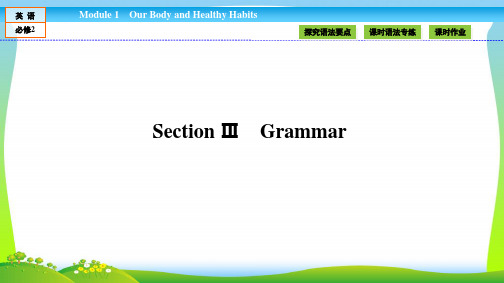
The agreement will come into force next spring. 协议将在明年春天生效。
名师指津:在时间或条件状语从句中,常用现在时代替一般将来时。
When he grows up,he will work as a lawyer. 他长大后,要当律师。
英语 必修2
Module 1 Our Body and Healthy Habits
英语 必修2
Module 1 Our Body and Healthy Habits
探究语法要点 课时语法专练 课时作业
The house faces south.这座房子面朝南。
Many of his friends backed his plan. 他的很多朋友支持他的计划。
Байду номын сангаас
2.表示身份和职务的名词用作动词 nurse(护理),doctor(诊治),host(主办),guard(守护),brother(像兄弟般对 待),mother(照顾)等。
Module 1 Our Body and Healthy Habits
探究语法要点 课时语法专练 课时作业
名词用作动词及 will 和 be going to 表示将来 一、名词用作动词 在英语中,同一个词可以转变其词性,而词义没有多大的改变。这种构词 法叫做词的转化。本单元介绍的是名词转化为动词的情况。 1.表示身体部位的名词用作动词 如:hand(交出;传递),back(倒车;支持),head(朝……去),shoulder(挑 起;承担),nose(闻出;觉察),eye(盯着看),face(面对;朝向)等。
5.物质名词用作动词表示与之有关的动作或行为
diet(节食),voice(表达),air(通风),cash(兑现),snow(下雪),water(浇水
高中英语外研版必修二《module 1 our body and healthy habits》教学
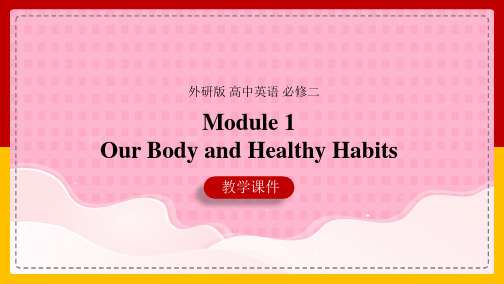
4. normal adj.正常的;一样的 n.通常标准;一样水平 教材原句 ①So as you can see from what I’ve said, I’m a normal (正常的) kind of person. ◆单句填空 ②Due to global warming, by the end of this century the average global temperature will be 3.5℃ above normal.
伤害 wound 指枪伤、刀伤、刺伤等皮肉之伤,特指战场上或打斗中受的伤
作及物动词时,表示“对……有害”,特指伤及一个人的心情、健康、权 harm 利、事业等。另外它也是不可数名词,意为“侵害、伤害”。构成固定
短语 “do/cause harm to” hurt 为一样用语,既可指肉体上的伤害,也可指精神上的伤害
③Most animals have little connection (connect) with animals of a different kind unless they kill them for food. ④There was nothing to connect (connect) him with the crime. ⑤The police are searching for the man in connection (connect) with the killing of a customer outside a bank.
with anxiety . ⑧The mother said nothing and she was anxious for her son. →The mother said nothing, anxious for her son .(用形容词短语作状语)
高中英语外研版必修二《Module1 Our Body and Healthy Habits Cul
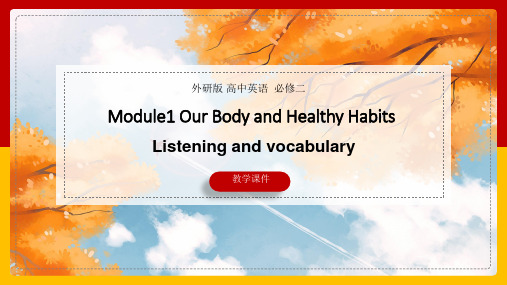
12) 下学期她将担负数学系主任。 (chair)
She will chair the math department next semester.
13) 他不管到哪里,总被人尾随。 (dog)
He was dogged wherever he went.
➢g. So I stopped eating chocolate and cheese. ➢h. Two months ago I went to see a doctor about my headaches.
f d bh c a g e
1. ---Your job ___ open for your
假设他以前用功些,他会在班里名 列前茅的。
5) When my car broke down, I
flagged a police car.
当我的汽车抛锚的时候,我打了个 手势招来一辆警车。
6) Finally, the escaped criminal
was cornered.
那名逃犯终究走投无路了。
don’t like light
_m__ig_r_a_in_e__
4. You make a noise with your
throat
__c_o_u_g_h____
5. Pain in your stomach
_st_o_m_a_c_h_a_c_h_e_
6. Pain in your throat
9) 对他来说,疏远、冷漠她是很困 难的。(distance)
It is difficult for him to distance himself from her.
外研版高中英语必修二英语Module1OurBodyandHealthyHabitsSectionⅡ
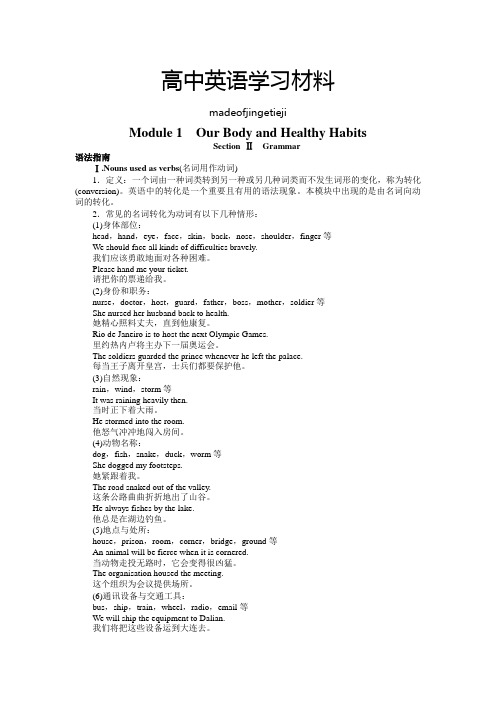
高中英语学习材料madeofjingetiejiModule 1Our Body and Healthy HabitsSection ⅡGrammar语法指南Ⅰ.Nouns used as verbs(名词用作动词)1.定义:一个词由一种词类转到另一种或另几种词类而不发生词形的变化,称为转化(conversion)。
英语中的转化是一个重要且有用的语法现象。
本模块中出现的是由名词向动词的转化。
2.常见的名词转化为动词有以下几种情形:(1)身体部位:head,hand,eye,face,skin,back,nose,shoulder,finger等We should face all kinds of difficulties bravely.我们应该勇敢地面对各种困难。
Please hand me your ticket.请把你的票递给我。
(2)身份和职务:nurse,doctor,host,guard,father,boss,mother,soldier等She nursed her husband back to health.她精心照料丈夫,直到他康复。
Rio de Janeiro is to host the next Olympic Games.里约热内卢将主办下一届奥运会。
The soldiers guarded the prince whenever he left the palace.每当王子离开皇宫,士兵们都要保护他。
(3)自然现象:rain,wind,storm等It was raining heavily then.当时正下着大雨。
He stormed into the room.他怒气冲冲地闯入房间。
(4)动物名称:dog,fish,snake,duck,worm等She dogged my footsteps.她紧跟着我。
The road snaked out of the valley.这条公路曲曲折折地出了山谷。
外研版高一英语必修二 Module 1 Our Body and Healthy Habits Th
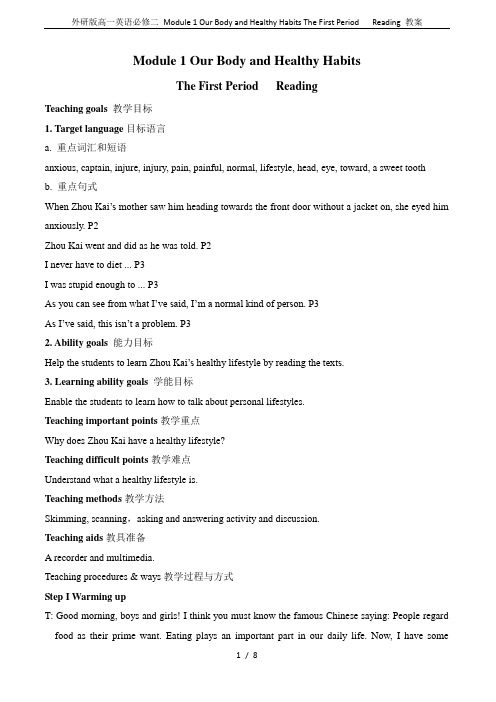
Module 1 Our Body and Healthy HabitsThe First Period ReadingTeaching goals教学目标1. Target language目标语言a. 重点词汇和短语anxious, captain, injure, injury, pain, painful, normal, lifestyle, head, eye, toward, a sweet toothb. 重点句式When Zhou Kai’s mother saw h im heading towards the front door without a jacket on, she eyed him anxiously. P2Zhou Kai went and did as he was told. P2I never have to diet ... P3I was stupid enough to ... P3As you can see from what I’ve said, I’m a normal kind of person. P3As I’ve said, this isn’t a problem. P32. Ability goals能力目标Help the students to learn Zhou Kai’s healthy lifestyle by reading the texts.3. Learning ability goals学能目标Enable the students to learn how to talk about personal lifestyles.Teaching important points教学重点Why does Zhou Kai have a healthy lifestyle?Teaching difficult points教学难点Understand what a healthy lifestyle is.Teaching methods教学方法Skimming, scanning,asking and answering activity and discussion.Teaching aids教具准备A recorder and multimedia.Teaching procedures & ways教学过程与方式Step I Warming upT: Good morning, boys and girls! I think you must know the famous Chinese saying: People regard food as their prime want. Eating plays an important part in our daily life. Now, I have somequestions for you. Please answer my questions with complete sentences. Do you often eat fish? S. No, I don’t often eat fish.T: Do you often eat fruit?S: Yes, I often eat fruit, almost every day.T: Do you often catch cold?S: No, I don’t quite often catch cold. I’m very fit.T: You eat a lot of sweet things, don’t you?S: I like eating sweet things, but I don’t often eat them.T: Do you often take exercise?S: I take a lot of exercise every week. For example, I do morning exercises every day.T: Good! That’s why you have a s trong body. Now, class, please go through the words in the box of Activity 1. Then do Activity 2 and tick the sentences true for you. And then make a dialogue with your partners just as what I did with you just now.After some time, ask some pairs to do their role-play.T: OK. You did an excellent job! Now, let’s learn some English proverbs in Activity 3. Now, I want someone to read the proverbs for us. OK, Mike, please read them out.Mike reads the proverbs.T: Very good! Your pronunciation is really beaut iful! Next, I’d like you to explain the meanings of these proverbs in English. Maybe it’s a little difficult for you. Just have a try.The students discuss the proverbs.T: OK. Stop here. Who volunteers to explain the first one to us? What is the meaning o f “You are what you eat”?S: It means what you like eating will have an effect on your body.T: Well done! What about the second one?S: It means that if you have a healthy body, you’ll think clearly and quickly.T: Yes, a strong body can help you make a success. Next one?S: It means that if you go to bed early and get up early, you’ll have a good rest at night, and if so, you’ll feel full of energy.T: That’s a good explanation! OK, next one?S: It means that fruit and vegetables will protect you from illnesses.T: Good! All of you did a good job! Now, let’s do some translation. Please translate these proverbsinto Chinese. Have a discussion first!The students work in pairs.T: OK. The first one, who wants to have a try?S: 吃什么补什么。
山西省岢岚县中学外研版高中英语必修二:Module 1 Our

Module 1 Our Body and Healthy Habits I. 模块教学目标技能目标Skill Goals●Talk about healthy lifestyles●Practice talking about future●Practice talking about health problems●Use nouns as verbs●Learn to write an essay about a health problemII. 目标语言功能句式Talk about the future“You’ll catch a bad cold,” said his mother.“I’ll be fine,” said Zhou Kai, as he opened the door. “Zhou Kai, you’ll get ill.”Practice talking about a health problemI think I’ve got pneumonia.Why? What are your symptoms?I’ve got a high temperature and my chest hurts when I breathe. Oh dear! What are you going to do?I’m going to stay in bed and ask the doctor to visit me.I’ll ring the doctor for you.Everyday EnglishTerrific!To be off work.Oh, dear!That couldn’t be better.I have a sweet tooth.I’m crazy about football.词1. 四会词汇diet, fat, fit, flu, rare, toothache, unhealthy, wealthy, rarely, proverb,汇anxious, injure, pain, lifestyle, head, eye, overweight, lung, throat, breathe, captain, injury, painful, normal, X-ray, awful, questionnaire, dentist, sweets, insurance, fever2. 认读词汇pneumonia, prescription, symptom, migraine3. 词组be connected with, take exercise, be crazy about, have a temperature, lie down, begin with, put ... into..., become ill, get / catch a cold语法Nouns used as verbsWhen Zhou Kai’s mother saw him heading towards the front door without a jacket on, she eyed him anxiously.And I’m not overweight so I never have to diet.Will / be going to for future actionsCan you lie down, please, and I’ll examine you?I’ll write you a prescription.My wife’s going to visit her this afternoon.My wife’s going to pick me up in a quarter of an hour.And I’ll ring the hospital.重点句子1. I take at least two hours’ exercise a week. P12. Early to bed, early to rise makes a man healthy, wealthy and wise. P13. An apple a day keeps the doctor away. P14. When Zhou Kai’s mother saw him heading towards the front door without a jacket on, she eyed him anxiously. P25. I’d rather eat a nice piece of fruit. P36. I was stupid enough to play football in the rain. P37. So as you can see from what I’ve said, I am a normal kind of person. P38. As I’ve said, this isn’t a problem. P39. Go to bed now or you’ll be really tired tomorrow. P4Ⅲ.教材分析与教材重组1. 教材分析本模块以Our Body and Healthy Habits为话题,旨在通过模块教学使学生通过讨论什么是健康,什么是健康的生活方式,如何才能获得健康和保持健康等问题,使学生树立正确健康观念,建立起一种健康的生活方式。
高一上学期外研版必修2 Module1 Our Body and Healthy Habits教案
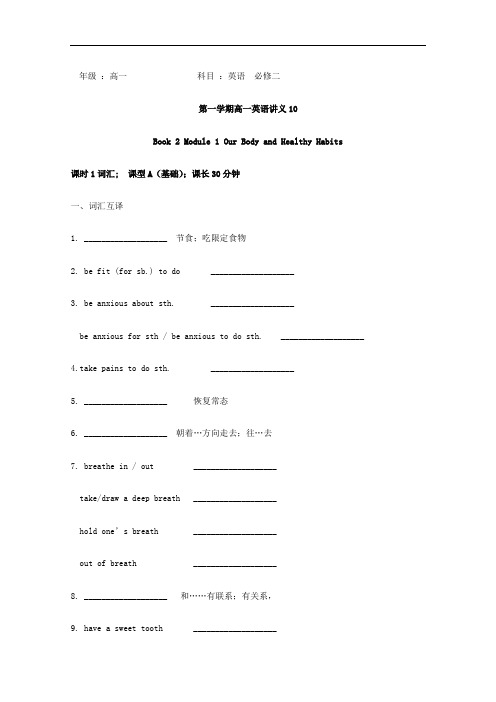
年级:高一科目:英语必修二第一学期高一英语讲义10Book 2 Module 1 Our Body and Healthy Habits课时1词汇; 课型A(基础);课长30分钟一、词汇互译1. ___________________ 节食;吃限定食物2. be fit (for sb.) to do ___________________3. be anxious about sth. ___________________be anxious for sth / be anxious to do sth. ___________________4.take pains to do sth. ___________________5. ___________________ 恢复常态6. ___________________ 朝着…方向走去;往…去7. breathe in / out ___________________take/draw a deep breath ___________________hold one’s breath ___________________out of breath ___________________8. ___________________ 和……有联系;有关系,9. have a sweet tooth ___________________10. ___________________ 宁愿做而……不愿做……11. ___________________ 足够……而可以做某事;非常……居然做某事12. be crazy about sth. ___________________13. ___________________ 第一/二/三…个做某事14. ___________________ 付给某人某物买……15. get / catch a cold ___________________16. ___________________ 做锻炼17. ___________________ 把……翻译成……18. ___________________ 据某人看来19. a bit of + n.u. / a bit of + a + n.c.___________________20. as a result ___________________as a result of … ___________________21. have a tempe rature ___________________22. lie down ___________________23. ___________________ 以……开始24. put … into … ___________________25. become ill ___________________二、词汇运用用 injure,hurt,wound ,ache,pain 的适当形式填空1. He jumped from the top of the wall and__________ his leg.他从墙上跳下扭伤了腿。
外研版高中英语必修二备课Module 1 Our Body and Healthy Habitsthe 3rd Period教案

Period 3 Grammar 1; Grammar 2; Function 整体设计教材分析This period is made up of three parts, that is, Grammar 1, Grammar 2 and Function. In Grammar 1, students will learn something about nouns used as verbs. To make students have a better understanding, you may remind them to note whether the two parts of speech are of the same meaning. For the class of a higher level, the teacher can add more words. Grammar 2 is the structure “will/be going to for future actions”. In this section two activities are designed. The first activity aims at helping students to sum up the different occasions when the two structures are used, while the second activity serves as the consolidation of Grammar 2. Function in this module is mainly to train students’ speaking abilities. Besides, they will learn some ways to talk about the future happenings. The teacher may first ask students to finish the two tasks individually and then check in a whole-class setting. To develop their speaking abilities to a full extent, you can encourage them to come up with a dialogue talking about the weather and the coming basketball match.三维目标1. 知识与技能1)Make students learn to sum up grammatical rules themselves.2)Make sure students can apply the grammar correctly.3)Train students’ speaking ability.2. 过程与方法1)Practice to improve their speaking skills.2)Individual work and pair work to make every student work in class.3)Explanations to make students master some grammar.3. 情感与价值Through the study of this period students will surely know more about some nouns used as verbs. Besides, they will be able to apply the structure “will/be going to for future actions” correctly.教学重点1. Encourage students to sum up grammatical rules.2. Train students’ speaking skills.教学难点1. How to help them apply nouns used as verbs.2. How to make them use the structure “will/be going to for future actions”correctly.教学过程→Step 1 Revision1. Greet students as usual.2. Have a dictation of the following words: diet, fit, rare, toothache, unhealthy, wealthy, rarely, proverb, anxious, captain, injure, pain, painful, normal, lifestyle, head, eye, overweight. . .3. Make students retell one of the passages.→Step 2 Grammar 1—Nouns used as verbs1. Besides the sentences offered on the textbook, the teacher may cite as many examples as possible, encouraging students to form a perceptive cognition about some nouns used as verbs.(Show the sentences on the screen. )1. She saw him heading towards the front door.2. She eyed him anxiously.3. I never have to diet.4. We have to face the difficulty.5. Mother took out some paper to paper the windows.6. You must dust the desk and chairs at least twice a day.7. She uses different activities for different uses in her classes.8. We didn’t have any excuse for that, but the old lady excused us.Suggested answers to activity 1:A)head, eye B)diet2. Activity 21)Read the nouns out while the students listen and follow. You should make sure they know what they mean.2)Students are required to do this activity individually, then check their answers with a partner.3)Collect the answers from a whole class setting.Suggested answers:1 houses2 fingered3 tastes4 handStudents work in pairs and recall as many such nouns as they can.E. g. arm, play, plan, program, pump, water, work, pin, fall, influence, joke, interview, cover, board, name, call, dress, address, ship, nurse, can, bottle, mark. . .→Step 3 Grammar 2—Will/be going to for future actions1. Activity 1The students work in pairs doing activity 1. They should take note of the different occasions in which “will” and “be going to” are used. If necessary, you can add some other sentences.The sentences you may use:1)Oh, I’m sorry, madam. I will do it right now.2)I’m going to the super market this afternoon.3)She is going to marry Tom next month.4)I’ve left my key in the office. Now I’ll go back and get it.Suggested answers to activity 1:A You use will when the speaker decides to do something as he speaks.B You use be going to when someone has decided to do something before.2. Activity 21)Read the example to the class and ensure that they know what to do.2)Ask them to complete the activity individually, then check their answers witha partner.3)Collect the answers from the whole class.Suggested answers:1 is going to2 ‘ll3 ‘m going to4 ‘s going to5 ‘ll6 is going to7 going to8 ‘ll3. Should time be sufficient, you can divide the whole class into two groups and have a competition. The rules are as follows:The teacher and students work with one another to come up with a sentence. The former speaks out half of a sentence, while the latter complete it. Note that what the teacher says should lead students to speak out the sentence easily and correctly. And if they get the correct sentence, they can gain ten points; if not, the same score will be taken off. The following table may be of help in scoring each group.e. g.T SsMy son is in bed and this afternoon I. . . . . . I’m going to take him to hospital.Does the weather forecast say. . . . . . it will rain soon?(Show the following table on the screen. )Group 1 Group 21 +102 +103 -104 +10 +105 -10→Step 4 Function—Talking about the future1. Show the following pictures on the screen and ask the students to complete the sentences below the pictures.“Don’t eat so many sweets. . . ”“Don’t climb that wall . . . ”Suggested answers:1 Don’t eat so many sweets, or you will have a sweet tooth!2 Don’t climb that wall, or you will fall and break your leg!2. Activity 11)Read through the three sentences while students listen and follow.2)Ask them to discuss which of the two possibilities is correct with a partner.3)Collect answers from the whole class.Suggested answer:A make a prediction3. Activity 21)Read through the verbs while the students listen and follow, then read them again and have the students repeat them after you. Pay attention to the second syllable stress in “become”.2)Read through the example, and have students do the activity individually.3)Collect the answers from the whole class as compete sentences.Suggested answers:1 will hurt2 ‘ll get/become3 ‘ll get/become4 will, be5 ‘ll fall4. Students work in pairs talking about the weather in the afternoon and the coming basketball match.→Step 5 Summary and HomeworkThe teacher summarizes the contents this period. This class students are acquainted with some nouns used as verbs. And they also knew more about the different occasions where “will” and “be going to” are applied. Though the Function part they learned how to talk about the future happenings. Then give the assignment: finish the workbook exercise 1-4.板书设计Module 1 Our Body and Healthy HabitsPeriod 3Grammar 1She saw him heading towards the front door.She eyed him anxiously.I never have to diet.We have to face the difficulty.Grammar 2Oh, I’m sorry, madam. I will do it right now.I’m going to the super market this afternoon.She is going to marry Tom next month.I’ve left my key in the office. Now I’ll go back and get it.活动与探究Search the Internet for more information about how to keep healthy using google, yahoo, or baidu.备课资料GrammarGrammar 1名词转化动词的用法词的转化指的是一个词不变化其词形,而由一种词类转化为另一种或几种词类。
- 1、下载文档前请自行甄别文档内容的完整性,平台不提供额外的编辑、内容补充、找答案等附加服务。
- 2、"仅部分预览"的文档,不可在线预览部分如存在完整性等问题,可反馈申请退款(可完整预览的文档不适用该条件!)。
- 3、如文档侵犯您的权益,请联系客服反馈,我们会尽快为您处理(人工客服工作时间:9:00-18:30)。
Module 1 Our Body and Healthy Habits I. 模块教学目标技能目标Skill GoalsTalk about healthy lifestylesPractice talking about futurePractice talking about health problemsUse nouns as verbsLearn to write an essay about a health problemII. 目标语言功能句式Talk about the future“You’ll catch a bad cold,”said his mother.“I’ll be fine,”said Zhou Kai, as he opened the door. “Zhou Kai, you’ll get ill.”Practice talking about a health problemI think I’ve got pneumonia.Why? What are your symptoms?I’vegot a high temperature and my chest hurts when I breathe. Oh dear! What are you going to do?I’m going to stay in bed and ask the doctor to visit me.I’ll ring the doctor for you.Everyday EnglishTerrific!To be off work.Oh, dear!That couldn’t be better.I have a sweet tooth.I’m crazy about football.词1. 四会词汇diet, fat, fit, flu, rare, toothache, unhealthy, wealthy, rarely, proverb, anxious,汇injure, pain, lifestyle, head, eye, overweight, lung, throat, breathe, captain, injury, painful, normal, X-ray, a wful, questionnaire, dentist, sweets, insurance, fever2. 认读词汇pneumonia, prescription, symptom, migraine3. 词组be connected with, take exercise, be crazy about, have a temperature, lie down, begin with, put ... into..., become ill, get / catch a cold语法Nouns used as verbsWhen Zhou Kai’smother saw him heading towards the front door without a jacket on, she eyed him anxiously.And I’m not overweight so I never have to diet.Will / be going to for future actionsCan you lie down, p lease, and I’ll examine you?I’ll write you a prescription.My wife’s going to visit her this afternoon.My wife’s going to pick me up in a quarter of an hour.And I’ll ring the hospital.重点句子1. I take at least two hours’ exercise a week. P12. Early to bed, early to rise makes a man healthy, wealthy and wise. P13. An apple a day keeps the doctor away. P14. When Zhou Kai’s mother saw him heading towards the front door without a jacket on, she eyed him anxiously. P25. I’d rather eat a nice piece of fruit. P36. I was stupid enough to play football in the rain. P37. So as you can see from what I’ve said, I am a normal kind of person. P38. As I’ve said, this isn’t a problem. P39. Go to bed now or you’ll be really tired tomorrow.P4Ⅲ.教材分析与教材重组1. 教材分析本模块以Our Body and Healthy Habits为话题,旨在通过模块教学使学生通过讨论什么是健康,什么是健康的生活方式,如何才能获得健康和保持健康等问题,使学生树立正确健康观念,建立起一种健康的生活方式。
针对日常生活中经常遇到的对健康有害的坏习惯,指导学生发表自己的见解和看法,通过进一步讨论使学生明确什么样的生活习惯是健康的。
并能应用相关谚语就此写一篇文章。
1.1 INTRODUCTION 这一部分设计了四个活动。
第一个活动帮助学生复习和学习有关饮食、锻炼、健康和疾病的词汇;第二个活动引导学生学会表达一些与饮食有关的句子;第三个活动向学生们介绍一些有关健康的西方谚语;第四个活动是前一个活动的延伸和深化,要学生说出一些有关健康的汉语谚语,并尝试把它们翻译出来。
总之,通过上述四个活动,使学生对起居和健康的关系有一个初步的了解。
1.2 VOCABULARY AND READING这一部分是本模块的主题部分。
首先是词汇的学习。
第一个活动就是帮助学生复习和学习一些介绍事物、身体和健康的词汇并回答有关的问题。
然后就是阅读活动,围绕周凯的生活方式,教材设计了四个活动,从细节到词汇,甚至也涉及到了文章的结构。
在能力上,主要是培养学生对词汇的应变力、理解力和分析问题的能力。
从情感态度上,通过周凯和妈妈的矛盾冲突和周凯对自己生活习惯的描述,帮助学生了解什么是健康的生活方式,如何树立健康的生活习惯,并在实际生活中,建立起自己的健康生活方式。
1.3 SPEAKING 1 通过讨论怎样保持健康,并且决定哪些是生活中有关健康的重要事项,使学生养成良好的生活方式。
1.4 FUNCTION 讨论将来的表达方法,掌握will表示预测的用法。
1.5 GRAMMAR 1 这一部分是有关构词法——名词动用的内容。
这部分不要求学生掌握具体的理论知识,只是使学生初步了解这种转化并使学生具体掌握一些转化的词例。
1.6 LISTENING AND VOCABULARY通过听医生和病人之间的对话掌握不同身份、职业的人说不同的话,学会询问病情和描述症状。
掌握有关疾病、症状和人体器官的单词。
1.7 GRAMMAR 2 这一部分是介绍will 和be going to 表示将来的用法,通过这部分教学,要使学生明确区分这两种表达的不同之处并在实际中运用。
1.8 PRONUNCIATION 听并跟读听力中出现的六个句子,注意音与音之间的连读。
1.9 SPEAKING 2 通过讨论对话掌握对健康问题的描述,包括描述、询问病情及提供帮助。
1.10 EVERYDAY ENGLISH通过对话,掌握一些常用的表达方式。
1.11 WRITING 通过把多个句子按顺序排列组成一段,训练学生的逻辑思维能力,通过讨论掌握描述生病的整个过程,并就此写一篇文章。
1.12 CULTURAL CORNER通过阅读了解有关各国的医疗卫生体系。
1.13 TASK 通过作问卷调查使学生意识到自己是否有健康的生活习惯,并养成良好的生活方式。
1.14 MODULE FILE 对整个模块做出总结,巩固所学知识。
2. 教材重组整合成一节阅读课。
2.1将INTRODUCTION的主要内容和VOCABULARY AND READING2.2 将GRAMMAR 1 和GRAMMAR 2 整合成一节语法课。
2.3 将LISTENING A ND VOCABULARY, PRONUNCIATION, EVERYDAY ENGLISH与WORKBOOK(P71)中的Listening整合成一节听力课。
和FUNCTION整合成一节口语课。
2.4 将SPEAKING 1, SPEAKING 22.5 将WRITING, TASK和WORKBOOK中的Writing整合成一节写作课。
和WORKBOOK(P69)中的Reading整合成一节泛读课。
2.6 将CULTURAL CORNER3. 课型设计与课时分配1st period Reading2nd period Grammar3rd period Listening4th period Speaking5th period Writing6th period Extensive ReadingIV. 分课时教案Period III ListeningTeaching goals教学目标1. Target language目标语言a.重点词汇和短语cough, migraine, chest, heart, lung, stomach, throat, breathe, pneumonia, symptom, penicillin, stomachache, X-ray, write sb. a prescription, have a temperature, broken arm, sorethroatb.重点句式P6How long will I be off work?My wife is going to pick me up in a quarter of an hour.℃.I’ve got a temperature of 372. Ability goals 能力目标Enable the students to get detailed information from the listening material and tell differentwords spoken by different persons.3. Learning ability goals学能目标Help the students learn how to describe symptoms of a health problem and how to giveadvice as a doctor.Teaching important points教学重点Help the students learn about parts of human body and symptoms of health problems..Listen to detailed information of the patient’s problemsTeaching difficult points教学难点Get information about the health problems of the patient and the doctor’s advice Teaching methods教学方法Discussion, listening and cooperative learning.Teaching aids教具准备A recorder and a computer.Teaching procedures & ways教学过程与方式Step I Greetings and RevisionT: Good morning / afternoon, students. Let’s check your homework. Please open your workbook.Check the answers to Exercise 4 with the whole class.Step II Lead-inT: This module mainly talks about our body and how to keep healthy. This class, we will listento a conversation between a doctor and a patient. After listening, you will know what is thematter with the patient and what the doctor advises her to do to keep healthy. Before listening, let’s do some tasks.Step III Pre-listeningAsk the students to do Activity 1 and Activity 2.T: You will have 2 minutes to finish vocabulary exercise in Activity 1. With the help of thisexercise, write the words according to the definitions in Activity 2 and Activity 6 within 4 minutes.Four minutes later check the answers with the whole class.T: All of you did an excellent job. Look at the bottom. Who volunteers to tell which of theseproblems have you had?S1: I’ve had a cough, but I’ve never had a toothache.S2: I’ve had a stomachache. I’ve never had migraine.Step IV ListeningTell the students to look through the questions before listening.T: We will listen to a conversation between a doctor and a patient. Before you listen to thetape, please read through the questions that you have to answer after listening. Talk aboutActivity 3 with your partners to decide which sentences are said by the doctor and which bythe patient.Play the tape for the students.T: Now let’s listen to it again and check the answers.Listen again and check the answers with the whole class.Step V Listening (WORKBOOK P71)Ask the students to do WORKBOOK Listening.T: Now, boys and girls, let’s look at the picture in workbook. There are three people in theing.picture. Say who they are and what’s happenS: The man is a doctor. The woman lying in the bed is a patient. The other woman is a nurse.Maybe the woman has got an illness. The doctor is giving her some advice.theT: Good. Now, let’s come to Exercise 12 to see what’s wrong with the woman and what doctor does to treat her. You will have 3 minutes to put these sentences in the correct order.Three minutes later.T: Listen to the conversation and check your answers.Play the tape for the students.T: Now let’s listen to it again to finish Exercise 13.Check the answers with the whole class.Step VI Post-listeningDialogueT: We have covered two listening materials. Both of them are conversations between the doctor and the patient. Work with your partners to make a dialogue. One acts as a doctor and the other as a patient. You will have 5 minutes to prepare for it.Five minutes later.T: Are you ready? Have a try!A sample version: D = doctor P = patientD: What’s bothering you, madam?P: I am not feeling very well. My whole body feels weak. I really feel terrible.D: Don’t worry. Let me examine you. Open your mouth. Do you have a sore throat?P: Yes, when I am speaking or swallowing things, it aches much.D: Let me take your temperature.P: What’s the temperature?D: It’s 38℃. You have got a temperature.P: Is it serious?D: Take it easy! You will be better after an injection.P: I don’t like injection. Will taking pills work?D: But having an injection has a quick effect.P: OK, I will endure it for I am busy these days. I must get better soon.D: I give you an injection now. But you need a rest.P: Oh, I have a lot work to do.D: You must look after yourself. You had better sleep early tonight.P: Yes, I will. Thank you!T: Excellent! You have done a good job.Pronunciationhe six sentences in Pronunciation which also appear in listening parts. T: Now, let’s look at tPay attention to liaisons between words and mark the sounds, which are linked. This time,please read the sentences following the tape.Everyday EnglishShow the six expressions on the screen.T: Please look at the screen. Guess the meanings of these expressions.Check the answers with the whole class.T: Now that you have known these expressions, please make several short dialogues using them.Sample dialogue 1:S1: Our class won the basketball match yesterday!S2: Terrific!Sample dialogue 2:S1: I was off work yesterday.S2: Oh dear! You missed an important meeting.Sample dialogue 3:S1: I can look after your cat while you are on holiday.uch.S2: That couldn’t be better. Thank you very mSample dialogue 4:S1: Have more chocolate?S2: Thank you. But I don’t have a sweet tooth.Sample dialogue 5:S1: I’m crazy about football.S2: So am I.Step VII HomeworkT: Today we have learnt how to communicate between the doctor the and patient and how to describe symptoms of a disease. After class, please finish off Exercise 8 in workbook.。
